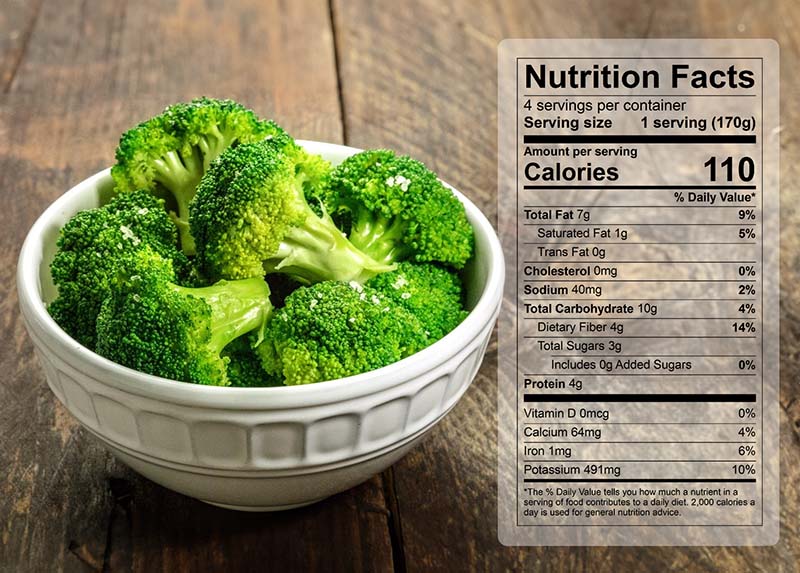Beginning a weight loss journey can sometimes feel like navigating a labyrinth of dietary decisions, but could the solution be found in a humble, green vegetable?
This blog investigates the potential of broccoli in weight management, exploring the truths behind the query ‘Does Broccoli Help You Lose Weight?’ and examining how this nutrient-dense vegetable can transform your approach to health and wellness.
Read more
- Do Almonds Help You Lose Weight? Additional Health Benefits.
- Is White Fish Good for Weight Loss? Diet Insights.
- Can Avocado Help You Lose Weight? Nutritional Information.
Does Broccoli Good for Weight Loss?
Broccoli stands out as an ideal option for those aiming to lose weight. This non-starchy vegetable stands out in weight management for its low-calorie yet high-fiber content. Eating broccoli can be a strategic move in your diet as its fiber and water fill you up, slowing digestion and keeping hunger at bay. This means you’re less likely to reach for high-calorie, heavily processed snacks.
There’s more to broccoli than just fiber; it’s also a powerhouse in boosting your metabolism. Foods like broccoli are known for their high thermic effect of food (TEF). Simply put, they ramp up your metabolic rate post-meal. This is a bonus for anyone aiming to lose weight, as a higher metabolism can aid in burning more calories.

Nutrition Facts of Broccoli
A single cup of raw broccoli, which weighs around 91 grams (g), contains a mere 31 calories. This makes it an ideal food for those mindful of their calorie intake. Here’s a breakdown of what you get in this one-cup serving:
- Calories: 31 kcal
- Protein: A good 2.75 g
- Carbohydrates: 6.04 g
- Fiber: 2.37 g, great for digestion
- Fat: A minimal 0.3 g
However, the true wonder of broccoli is in its rich vitamin content. It’s an excellent source of Vitamin C, providing a whopping 91% of your Daily Value (DV). Vitamin C is essential for immune function and skin health. Equally impressive is its Vitamin K content, covering 77% of the DV. This vitamin is crucial for blood clotting and bone health.
Broccoli is also a good source of Folate (Vitamin B9), offering 15% of the DV in a single cup. Folate is vital for normal cellular function and tissue growth, making it especially important for pregnant women.
Each serving of broccoli also gives you a boost of minerals like potassium, magnesium, iron, and calcium, though in smaller amounts. These minerals are essential for various bodily functions, including heart health, muscle function, and bone strength.

Benefits of Broccoli for Weight Loss
Adding broccoli to your diet is a wise move for anyone aiming to lose weight and enhance their overall health. Remember, weight loss is a complex journey that requires more than just dietary changes; it involves regular physical activity, stress management, and sufficient sleep.
A bowl of cooked broccoli, which is both filling and low in calories, contains about 50 to 65 calories per serving. Per 100 grams, broccoli has approximately 39 calories, categorizing it as a low-calorie food. For weight loss, the principle is simple: you need to burn more calories than you consume.
Broccoli’s high dietary fiber content, about 3.3 grams per 100 grams, is a key player in weight management. Fiber absorbs water, increasing the bulk of food in your stomach, thereby keeping you fuller for longer. This reduces your overall appetite and helps prevent the urge for mid-meal snacking.
Vitamin C is another essential nutrient found abundantly in broccoli. It not only boosts your immunity and promotes healthier skin and hair but also plays a role in fat burning.
Then there’s Vitamin K, found in broccoli, which aids in the metabolism of glucose and fats. It’s particularly effective in targeting stubborn belly fat.
Broccoli is also a source of carotenoids, plant compounds that can stimulate fat burning, contributing to weight reduction.
With a high water content of 90%, broccoli is excellent for maintaining a healthy metabolism and ensuring hydration. Efficient calorie burning is crucial in weight loss, and a well-functioning metabolism is a cornerstone of this process.

Additional Health Advantages of Broccoli
Broccoli’s role in health extends far beyond weight management, offering a multitude of other health benefits that make it a superfood in its own right.
Promotes Cardiovascular Health
Broccoli is a boon for your heart. It belongs to the cruciferous vegetable family, known for promoting healthy blood flow and heart strength. Regular consumption of broccoli can help relax blood vessels, which in turn can lower blood pressure, a key factor in cardiovascular health.

Improves Vision
Rich in vitamin A and antioxidants, broccoli is excellent for eye health. These nutrients are vital in preventing age-related eye issues like macular degeneration and cataracts.
Including broccoli in your diet could be a proactive step towards maintaining good vision as you age.

Protects Against Cancer
One of the most notable benefits of broccoli is its potential role in cancer prevention. Loaded with antioxidants, including the powerful compound sulforaphane, broccoli may help prevent cell damage.
This can play a role in stopping the development of cancerous cells, offering a dietary approach to cancer prevention.

Reduces Inflammation
A 2014 study highlighted broccoli’s anti-inflammatory capabilities. The study found that sulforaphane, an antioxidant in broccoli, helped reduce inflammation markers in lab tests.
This suggests that the nutrients in broccoli could be effective in combating inflammation, which is linked to many chronic diseases.

Lowers Cholesterol Levels
Broccoli is also a rich source of soluble fiber, which is instrumental in removing cholesterol from the body. The fiber in broccoli binds with bile acids in the digestive system, making it easier to eliminate cholesterol. This process can contribute significantly to lowering cholesterol levels, a key factor in preventing heart diseases.
Note: To make the most of broccoli’s health benefits, consider how you cook it. Steaming is the best way to preserve its nutrients, especially the water-soluble ones like vitamin C. Also, incorporating broccoli into a diverse diet is key; it works best in combination with other healthy lifestyle choices. Remember, the more varied your diet, the wider the range of nutrients you’ll receive, bolstering your overall health.
Possible Negative Effects of Broccoli
Broccoli, while being a nutritional powerhouse, can have some adverse effects, particularly when consumed in large amounts or by individuals with specific health conditions. Here are some potential negative effects to be aware of:
Digestive Discomfort: High fiber foods, like broccoli, can cause digestive issues such as flatulence or bowel irritation, especially when consumed in large quantities. This is a common side effect associated with all cruciferous vegetables due to their high fiber content. While fiber is beneficial for digestive health, excessive intake can lead to discomfort, particularly in individuals not accustomed to a high-fiber diet.
Effects on Blood Pressure and Bleeding Risk: Broccoli is rich in potassium and vitamin K, which, while beneficial in moderate amounts, can have unintended consequences when consumed excessively. High potassium intake can lead to lowered blood pressure, which might be an issue for those already dealing with low blood pressure. Additionally, vitamin K plays a crucial role in blood clotting. Therefore, for individuals on blood thinners, excessive consumption of broccoli could increase the risk of bleeding due to its vitamin K content.
Note: It’s important to maintain a balanced diet and consume broccoli in moderation, especially if you have specific health conditions or dietary restrictions. For individuals on medication or with existing health issues, consulting with a healthcare provider before making significant dietary changes is always advisable. Remember, variety is key in a healthy diet, so including different types of vegetables can help mitigate the risk of these side effects while still reaping the health benefits.
How Much Broccoli Should I Eat to Lose Weight?
To leverage broccoli for weight loss, incorporating it into your meals 2-3 times a week is a great strategy. Aiming for about 400 grams of broccoli per week can be effective. It’s important to remember that adults are generally recommended to consume two to four cups of vegetables daily, depending on individual factors like sex, height, and weight.
Broccoli, with its low calorie yet nutrient-dense profile, is an excellent addition to a weight loss diet. It’s high in fiber, which aids in feeling full and satisfied, and is packed with essential nutrients that support overall health. However, it’s crucial to maintain a balanced diet. This means including a variety of other fruits and vegetables alongside broccoli.
While broccoli can contribute significantly to your weight management efforts, it’s most effective when part of a well-rounded diet. A healthy eating plan for weight loss should include a diverse range of foods to ensure you’re getting all the necessary nutrients. Remember, the key to a successful weight loss diet is balance, variety, and moderation.
Conclusion
In conclusion, our exploration into the question ‘Does Broccoli help you lose weight?’ reveals that this green vegetable is indeed a powerhouse of nutrition and a valuable ally in weight management. Broccoli’s high fiber content, essential nutrients, and low-calorie profile make it an ideal choice for those seeking a healthier lifestyle and effective weight loss. We invite you to share your own experiences with broccoli and how it has impacted your health journey. Your stories inspire us and others in our community. Don’t forget to check out more informative and engaging blogs from Sure Life Health, where we continuously unravel the mysteries of healthy living and nutrition.
Professor Gaye Cunnane, PhD, MB, FRCPI
As the Director of Health and Wellbeing at RCPI, Professor Gaye Cunnane is at the helm of initiatives aimed at enhancing the health and well-being of RCPI Trainers and Trainees. Her role extends beyond administration; she is also a respected clinical professor of rheumatology and a consultant rheumatologist at Trinity College Dublin (TCD) and St James’s Hospital. Prof. Cunnane’s medical journey began at TCD, where she graduated from medical school, and her path has been marked by both clinical and academic excellence.
After completing her basic clinical training in medicine, she embarked on PhD studies at University College Dublin and St Vincent’s University Hospital. Her research during this period was focused on prognostic markers in early inflammatory arthritis, a project that saw her collaborating with esteemed universities across Europe, including in Switzerland, The Netherlands, the UK, and Sweden.
Prof. Cunnane’s career took her to the University of California, San Francisco, where she spent three years delving into research on new treatments for lupus. Her academic prowess led her to the University of Leeds in 2001 as a senior lecturer, before returning to Ireland in 2003 to assume her current roles. She has also served as the National Specialty Director for Rheumatology training in Ireland, Programme Director for Basic Specialist Training with RCPI, and as a past President of the Irish Society for Rheumatology.
PUBLISHED ARTICLES
“Rheumatic disease differentiation using immunoglobulin G sugar printing by high-density electrophoresis”: Published in The Journal of Rheumatology, this study reflects her in-depth investigation into rheumatic diseases.
“Benefits of exercise in patients with rheumatoid arthritis: a randomized controlled trial”: This research work, highlighting the positive impact of exercise on rheumatoid arthritis, underscores Prof. Cunnane’s dedication to practical, patient-centered research.
Additionally, Prof. Cunnane has made notable contributions to the Annals of the Rheumatic Diseases, discussing early referral, diagnosis, and treatment of rheumatoid arthritis. She has also been involved in a study on the NCBI platform investigating exercise benefits in rheumatoid arthritis patients.
Professor Gaye Cunnane’s career is a testament to her commitment to improving patient outcomes in rheumatology through rigorous research, clinical excellence, and dedicated teaching. Her work continues to influence the field of rheumatology, both in Ireland and internationally.

